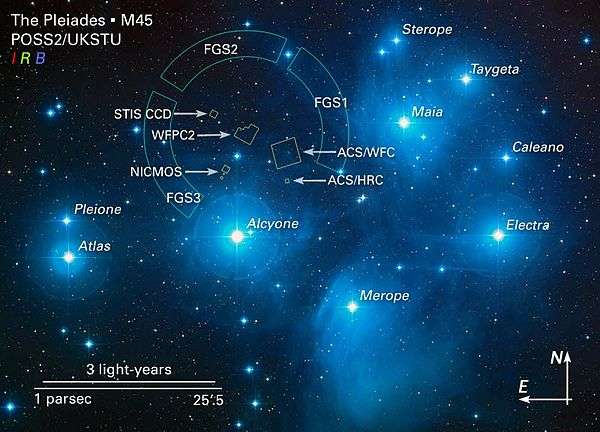Taygeta
 Taygeta is the bright star at the top right of the map. | |
| Observation data Epoch J2000.0 Equinox J2000.0 | |
|---|---|
| Constellation | Taurus |
| Right ascension | 03h 45m 12.49578s[1] |
| Declination | 24° 28′ 02.2097″[1] |
| Apparent magnitude (V) | 4.30[2] |
| Characteristics | |
| U−B color index | -0.48[3] |
| B−V color index | -0.12[3] |
| Astrometry | |
| Radial velocity (Rv) | 10.1[2] km/s |
| Proper motion (μ) | RA: 21.24 ± 0.38[1] mas/yr Dec.: -40.56 ± 0.35[1] mas/yr |
| Parallax (π) | 7.97 ± 0.33[1] mas |
| Distance | 440 ly (135 pc) |
| Details | |
| Taygeta A | |
| Mass | 4.5[4] M☉ |
| Luminosity | 600[4] L☉ |
| Taygeta B | |
| Mass | 3.2[4] M☉ |
| Luminosity | 150[4] L☉ |
| Other designations | |
| Database references | |
| SIMBAD | data |
Coordinates: ![]() 03h 45m 12.49578s, +24° 28′ 02.2097″
Taygeta, also designated 19 Tauri, is a triple star system in the constellation of Taurus and a member of the Pleiades open star cluster (M45). It is approximately 440 light years from the Sun.
03h 45m 12.49578s, +24° 28′ 02.2097″
Taygeta, also designated 19 Tauri, is a triple star system in the constellation of Taurus and a member of the Pleiades open star cluster (M45). It is approximately 440 light years from the Sun.
Nomenclature
19 Tauri is the star's Flamsteed designation. It also bears the little-used Bayer designation q Tauri. Under the rules for naming objects in multiple star systems,[5] the primary component is designated Taygeta A with its two sub-components designated Taygeta Aa and Taygeta Ab. The secondary component is designated Taygeta B.
The system bore the traditional name Taygeta (or Taygete).[6] Taygete was one of the Pleiades sisters in Greek mythology. In 2016, the International Astronomical Union organized a Working Group on Star Names (WGSN)[7] to catalogue and standardize proper names for stars. The WGSN approved the name Taygeta for this star on 21 August 2016 and it is now so entered in the IAU Catalog of Star Names.[8]
Properties
Taygeta A, is a blue-white B-type subgiant with an apparent magnitude of +4.30. It is a spectroscopic binary, whose component stars have magnitudes of +4.6 and +6.1. They are separated by 0.012 arcseconds and complete one orbit every 1313 days. The 8th magnitude companion, Taygeta B, is 69 arcseconds away.
Taygeta was once reported to be variable,[9] but has since been measured to be one of the least variable of stars.[10][11]
See also
- Lists of stars in the constellation Taurus
- Class B Stars
References
- 1 2 3 4 5 van Leeuwen, F. (2007). "Validation of the new Hipparcos reduction". Astronomy and Astrophysics. 474 (2): 653–664. arXiv:0708.1752
 . Bibcode:2007A&A...474..653V. doi:10.1051/0004-6361:20078357. Vizier catalog entry
. Bibcode:2007A&A...474..653V. doi:10.1051/0004-6361:20078357. Vizier catalog entry - 1 2 "SIMBAD query result: TAYGETA". Centre de Données astronomiques de Strasbourg. Retrieved 2014-08-18.
- 1 2 Penston M.J. (1973). "Photoelectric UBV observations made on the Palomar 20-inch telescope" (PDF). Mon. Not. R. Astron. Soc. 164 (2): 133. Bibcode:1973MNRAS.164..133P. doi:10.1093/mnras/164.2.133.
- 1 2 3 4 Professor James B. (Jim) Kaler. "TAYGETA (19 Tauri)". University of Illinois. Retrieved 2014-08-18.
- ↑ Format, The Washington Double Star Catalog, Brian D. Mason, Gary L. Wycoff, and William I. Hartkopf, Astrometry Department, United States Naval Observatory. Accessed on line August 20, 2008.
- ↑ Allen, Richard Hinckley (1899). Star-names and their meanings. G. E. Stechert. p. 407. Retrieved 2009-10-10.
- ↑ IAU Working Group on Star Names (WGSN), International Astronomical Union, retrieved 22 May 2016.
- ↑ "IAU Catalog of Star Names". Retrieved 28 July 2016.
- ↑ Samus, N. N.; Durlevich, O. V.; et al. (2009). "VizieR Online Data Catalog: General Catalogue of Variable Stars (Samus+ 2007-2013)". VizieR On-line Data Catalog: B/gcvs. Originally published in: 2009yCat....102025S. 1. Bibcode:2009yCat....102025S.
- ↑ Percy, John R.; Wilson, Joseph B. (2000). "Another Search for Maia Variable Stars". The Publications of the Astronomical Society of the Pacific. 112 (772): 846. Bibcode:2000PASP..112..846P. doi:10.1086/316577.
- ↑ Adelman, S. J. (2001). "Research Note Hipparcos photometry: The least variable stars". Astronomy and Astrophysics. 367: 297. Bibcode:2001A&A...367..297A. doi:10.1051/0004-6361:20000567.
External links
| Wikimedia Commons has media related to Taygeta (star). |
- Jim Kaler's Stars, University of Illinois:TAYGETA (19 Tauri)